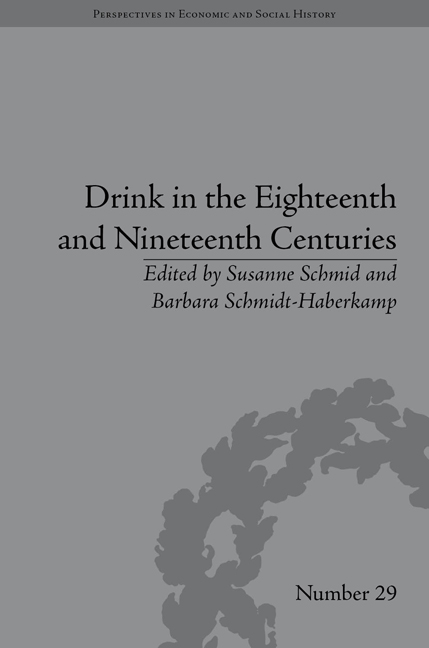Book contents
- Frontmatter
- CONTENTS
- Acknowledgements
- List of Contributors
- List of Figures and Tables
- Introduction
- Part I Ritual and Material Culture
- Part II Institutions and Social Class
- Part III Temperance and the Misery of Alcohol
- Part IV Intoxication and Therapy
- Part V Case Studies: Rum, Cocoa and Magical Potions
- 12 ‘Been to Barbados’: Rum(bullion), Race, the Gaspée and the American Revolution
- 13 A Beverage for the Masses: The Democratization of Cocoa in Nineteenth-Century American Fiction
- 14 The Power of the Potion: From Gothic Horror to Health Drink, or, How the Elixir became a Commodity
- Notes
- Index
12 - ‘Been to Barbados’: Rum(bullion), Race, the Gaspée and the American Revolution
from Part V - Case Studies: Rum, Cocoa and Magical Potions
- Frontmatter
- CONTENTS
- Acknowledgements
- List of Contributors
- List of Figures and Tables
- Introduction
- Part I Ritual and Material Culture
- Part II Institutions and Social Class
- Part III Temperance and the Misery of Alcohol
- Part IV Intoxication and Therapy
- Part V Case Studies: Rum, Cocoa and Magical Potions
- 12 ‘Been to Barbados’: Rum(bullion), Race, the Gaspée and the American Revolution
- 13 A Beverage for the Masses: The Democratization of Cocoa in Nineteenth-Century American Fiction
- 14 The Power of the Potion: From Gothic Horror to Health Drink, or, How the Elixir became a Commodity
- Notes
- Index
Summary
Ogden Nash, possibly the world's premium punster of all times, once infamously quipped: ‘Candy / Is dandy / But liquor / Is quicker’. And even when one specific part of world history is considered, one which connects Europe, Africa, the Caribbean and the American East Coast colonies, Nash's words seem to ring true. As soon as mankind had figured out that this grass, known as saccharum officinarum (or sugar cane, ‘sugar of the apothecaries’), could be cultivated and processed to yield crystallized sweetness, things began to be high-proof, complex and global. This chapter aims to highlight how sugar, molasses and, first and foremost, rum influenced world history in the sense that this drink became a crucial player in the British colonies' development towards and struggle for independence.
Sugar cane wants warmth and moisture. From the Canary Islands, Madeira and the Azores, sugar cane travelled with Columbus first to Hispaniola, where it was planted and grew with awesome rapidity and yield, and then on various Portuguese explorer vessels to other islands of the Caribbean and to the coasts of South America. The remarkable burgeoning of sugar cane initiated a growing demand for human labour, since its cultivation requires intensive toil and fast milling after harvest; it needs to be boiled quickly before the sugar content can diminish.
- Type
- Chapter
- Information
- Drink in the Eighteenth and Nineteenth Centuries , pp. 141 - 150Publisher: Pickering & ChattoFirst published in: 2014



